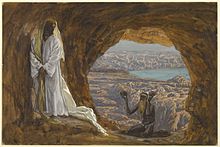
A Black Fast, also known as a strict fast, is a form of early Christian fasting.[1] Those undertaking a Black Fast consume no food or water during the day and then break the fast after sunset with prayer, as well as water and a vegetarian meal devoid of meat, eggs, dairy products (lacticinia), and alcohol.[2][3][4][5] Christians normatively fasted in this way during Lent prior to the 6th century.[6]
- ^ Chambers's Journal. W & R Chambers. 1926. p. 745.
In Lent the clergy kept strict fast; a 'black fast,' as they call it in Ireland.
- ^ Becchio, Bruno; Schadé, Johannes P. (2006). Encyclopedia of World Religions. Foreign Media Group. ISBN 978-1-60136-000-7.
Black Fast: Only one meal in the evening is allowed on these days of penance. In addition, meat, eggs, dairy products, and alcohol are forbidden. Only bread, water, and vegetables forms the diet of such a fast.
- ^ Cite error: The named reference
Cain2018was invoked but never defined (see the help page). - ^ Butler, Alban (1774). The Moveable Feasts, Fasts, and Other Annual Observances of the Catholic Church. C. Kiernan. p. 257.
It is undoubted, that anciently to drink on fasting days was no less forbid than to eat, only in the refection after sunset.
- ^ Cite error: The named reference
Weiser1963was invoked but never defined (see the help page). - ^ Butler, Alban (1839). The Moveable Feasts, Fasts, and Other Annual Observances of the Catholic Church. Dublin: James Duffy. p. 144-146.
The primitive Christians in Lent broke their fast only after sunset, and then usually only with herbs, roots, and bread. At least all were obliged to abstain not only from flesh meat, but also from fish, and whatever had life; also whatever is derived from flesh, as eggs, milk, cheese, butter, according to the ancient canon. Likewise from wine, which in the primitive ages was no less forbidden on all fasting days than the use of flesh meat itself ... Some mitigations were introduced in part of abstinence in the sixth century ... Fish was in the same age allowed, but not of the dearer and more dainty kinds.